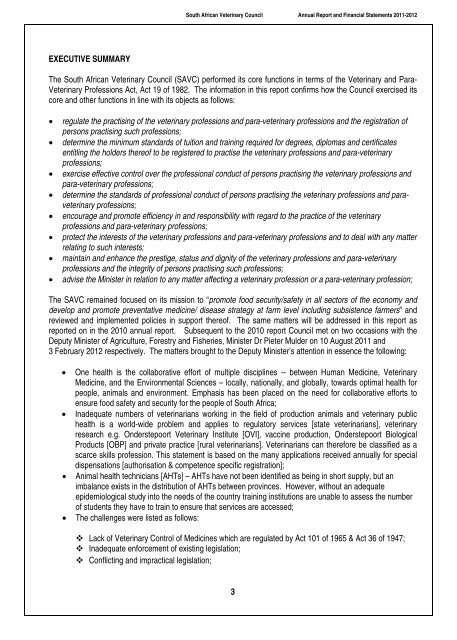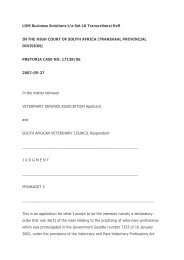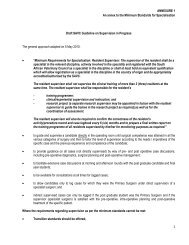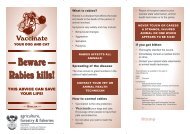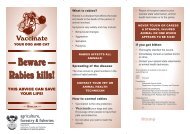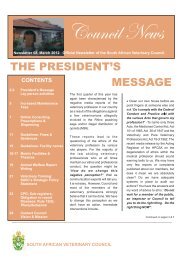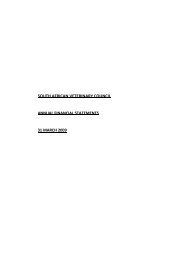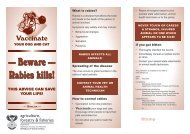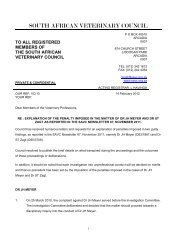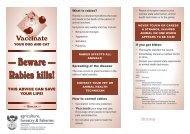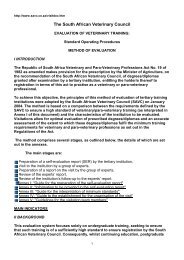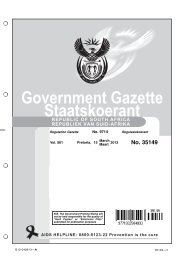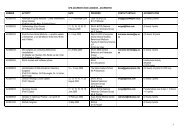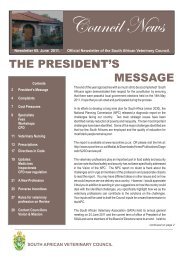Annual Report - the South African Veterinary Council
Annual Report - the South African Veterinary Council
Annual Report - the South African Veterinary Council
You also want an ePaper? Increase the reach of your titles
YUMPU automatically turns print PDFs into web optimized ePapers that Google loves.
<strong>South</strong> <strong>African</strong> <strong>Veterinary</strong> <strong>Council</strong> <strong>Annual</strong> <strong>Report</strong> and Financial Statements 2011-2012<br />
EXECUTIVE SUMMARY<br />
The <strong>South</strong> <strong>African</strong> <strong>Veterinary</strong> <strong>Council</strong> (SAVC) performed its core functions in terms of <strong>the</strong> <strong>Veterinary</strong> and Para-<br />
<strong>Veterinary</strong> Professions Act, Act 19 of 1982. The information in this report confirms how <strong>the</strong> <strong>Council</strong> exercised its<br />
core and o<strong>the</strong>r functions in line with its objects as follows:<br />
• regulate <strong>the</strong> practising of <strong>the</strong> veterinary professions and para-veterinary professions and <strong>the</strong> registration of<br />
persons practising such professions;<br />
• determine <strong>the</strong> minimum standards of tuition and training required for degrees, diplomas and certificates<br />
entitling <strong>the</strong> holders <strong>the</strong>reof to be registered to practise <strong>the</strong> veterinary professions and para-veterinary<br />
professions;<br />
• exercise effective control over <strong>the</strong> professional conduct of persons practising <strong>the</strong> veterinary professions and<br />
para-veterinary professions;<br />
• determine <strong>the</strong> standards of professional conduct of persons practising <strong>the</strong> veterinary professions and paraveterinary<br />
professions;<br />
• encourage and promote efficiency in and responsibility with regard to <strong>the</strong> practice of <strong>the</strong> veterinary<br />
professions and para-veterinary professions;<br />
• protect <strong>the</strong> interests of <strong>the</strong> veterinary professions and para-veterinary professions and to deal with any matter<br />
relating to such interests;<br />
• maintain and enhance <strong>the</strong> prestige, status and dignity of <strong>the</strong> veterinary professions and para-veterinary<br />
professions and <strong>the</strong> integrity of persons practising such professions;<br />
• advise <strong>the</strong> Minister in relation to any matter affecting a veterinary profession or a para-veterinary profession;<br />
The SAVC remained focused on its mission to “promote food security/safety in all sectors of <strong>the</strong> economy and<br />
develop and promote preventative medicine/ disease strategy at farm level including subsistence farmers” and<br />
reviewed and implemented policies in support <strong>the</strong>reof. The same matters will be addressed in this report as<br />
reported on in <strong>the</strong> 2010 annual report. Subsequent to <strong>the</strong> 2010 report <strong>Council</strong> met on two occasions with <strong>the</strong><br />
Deputy Minister of Agriculture, Forestry and Fisheries, Minister Dr Pieter Mulder on 10 August 2011 and<br />
3 February 2012 respectively. The matters brought to <strong>the</strong> Deputy Minister’s attention in essence <strong>the</strong> following:<br />
• One health is <strong>the</strong> collaborative effort of multiple disciplines -- between Human Medicine, <strong>Veterinary</strong><br />
Medicine, and <strong>the</strong> Environmental Sciences – locally, nationally, and globally, towards optimal health for<br />
people, animals and environment. Emphasis has been placed on <strong>the</strong> need for collaborative efforts to<br />
ensure food safety and security for <strong>the</strong> people of <strong>South</strong> Africa;<br />
• Inadequate numbers of veterinarians working in <strong>the</strong> field of production animals and veterinary public<br />
health is a world-wide problem and applies to regulatory services [state veterinarians], veterinary<br />
research e.g. Onderstepoort <strong>Veterinary</strong> Institute [OVI], vaccine production, Onderstepoort Biological<br />
Products [OBP] and private practice [rural veterinarians]. Veterinarians can <strong>the</strong>refore be classified as a<br />
scarce skills profession. This statement is based on <strong>the</strong> many applications received annually for special<br />
dispensations [authorisation & competence specific registration];<br />
• Animal health technicians [AHTs] – AHTs have not been identified as being in short supply, but an<br />
imbalance exists in <strong>the</strong> distribution of AHTs between provinces. However, without an adequate<br />
epidemiological study into <strong>the</strong> needs of <strong>the</strong> country training institutions are unable to assess <strong>the</strong> number<br />
of students <strong>the</strong>y have to train to ensure that services are accessed;<br />
• The challenges were listed as follows:<br />
Lack of <strong>Veterinary</strong> Control of Medicines which are regulated by Act 101 of 1965 & Act 36 of 1947;<br />
Inadequate enforcement of existing legislation;<br />
Conflicting and impractical legislation;<br />
3


